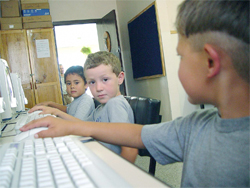With 75% of UK state secondary schools signed up to the National Theatre Collection, ten additional productions will now be available to schools, colleges and educational establishments from today in partnership with Bloomsbury Publishing and ProQuest, part of Clarivate. These ten new productions will complete the second Collection, making 50 titles available to the education sector worldwide.
Following the announcement from the UK Government for all UK schools to close in light of the Coronavirus pandemic, the National Theatre Collection will now be available to pupils and teachers at state schools and state-funded further education colleges via remote access in partnership with Bloomsbury Publishing. Schools will be able to share log-in details with pupils to access resources at home during this period.
Schools around the world are being invited to tune in to a unique digital broadcast this week, as part of global celebrations to mark the 400th anniversary of the death of William Shakespeare. Digital content providers Discovery Education will host a virtual field trip from Stratford-upon-Avon on 22nd April from 14:30 to 15:00 (BST), giving students worldwide the chance to explore the Bard’s birthplace, school, and other historic locations without leaving their classrooms. Presented by Diane Louise Jordan and featuring Sir Ian McKellen, the Shakespeare 400 broadcast will provide a compelling insight into the life and legacy of the world’s most famous playwright.
Driftwood Software have announced the release of an all-new version of FX Live, the popular sound effect playback application for the iPad. This app allows teachers to run multiple effects simultaneously, with fades and transitions all being handled by the iPad at the touch of a button. The entire production can be designed and built in advance, making the running of the performance a simple operation.
Dublin’s Larkin Community College has been working with the Abbey Theatre to bring a terrific new surge of creativity into their classrooms. The legendary theatre, also known as Amharclann na Mainistreach and the National Theatre of Ireland, has been working with the local college on their Theatre-Making and Citizenship programme. According to the Irish Times, this initiative has seen students hugely invested in creative learning.

I strongly believe the arts have the power to transform lives and urge schools to spend a portion of the Pupil Premium on arts education. The earlier a child's engagement with the arts, the more likely they are to develop vital skills such as communication, analysis, confidence and teamwork. These skills can have hugely positive effects on children’s academic achievements, helping them better engage with the mainstream curriculum and in turn improving their results at school.
Whilst there is mounting pressure on today’s teachers to improve their pupils’ academic achievements in traditional subjects such as maths, English or science, the benefits of arts education on these very subjects is becoming ever more apparent. Throughout The Prince's Foundation for Children & the Arts' Start programme, for example, which reaches out to disadvantaged pupils and creates sustainable partnerships between their schools and local cultural venues, we asked teachers about the positive correlation they had seen between arts education and academic achievement.

As someone who has traditionally used live and creative methods for teaching young people - such as theatre in education - I wondered if I should be the first in the queue to rail against the insidious rise of online learning.
How can online learning possibly replace an interactive learning experience between real people? Maybe to see technology as an enemy is to miss the point and misunderstand the potential uses of online. Actually, it should be a love affair. Live engagement brings all the benefits we are already aware of: flexibility, responsiveness, immediacy, and relationship building, kinaesthetic learning, the list goes on. But online learning brings much more too – sustainability, reach, economies of scale, connecting with the world beyond, and the ability to store, record, and measure.
So why should we consider these things polar opposites? What if they were perfect partners?

A community-driven platform for showcasing the latest innovations and voices in schools
Pioneer House
North Road
Ellesmere Port
CH65 1AD
United Kingdom